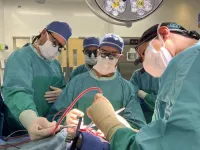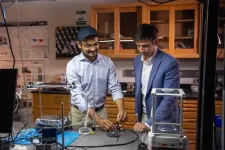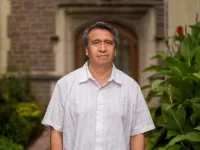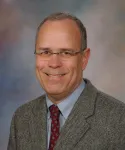(Press-News.org) Dr. Olga Denysiuk, MD, PhD, is a highly skilled eye surgeon in Ukraine who now finds herself at the frontlines of ophthalmic trauma care caused by war.
“Every day, I am fighting my war in the operating room,” says Denysiuk. “Cases of eye trauma are mounting and it’s critical that we have surgeons trained to delicately manage eyelid and orbital injuries.”
Denysiuk is one of two ocular specialists selected for a unique humanitarian fellowship at the University of Calgary’s Cumming School of Medicine (CSM), training surgeons in areas of geopolitical crisis in advanced periocular reconstructive techniques.
“The devastating effects of war extend beyond the battlefield, leaving lasting scars on the bodies and lives of those affected,” says Dr. Karim Punja, MD, an orbit and oculofacial plastic surgeon, and clinical associate professor at the CSM. “Recognizing the acute shortage of oculofacial plastic surgery expertise, we devised a fellowship that is as much about healing those impacted by war as it is about learning.”
During the one-year program Denysiuk will spend four months immersed in advanced surgical techniques in Calgary, then return to Ukraine for four months to apply those skills with virtual and in-person surgical mentorship from Punja, Dr. Michael Kryshtalskyj, MD, a fourth-year ophthalmology resident and other Alberta Health Services surgeons. The cycle completes with a four month return to Calgary.
The idea for the fellowship grew out of an impromptu conversation between Punja and Kryshtalskyj, who is also the co-founder of the Canadian Ophthalmological Society Foundation’s Eyes on Ukraine Initiative. The pan-Canadian program is dedicated to supporting the treatment of eye injuries in Ukraine.
“The need for specialized care in treating complex blast injuries will persist for decades,” says Kryshtalskyj. “Fellowship opportunities for Ukrainian ophthalmologists to train in orbit and oculofacial plastic surgery will ensure that Ukraine has the capacity to care for these important injuries in the years to come.”
Ukraine has only a handful of oculofacial plastic surgeons who have the expertise to delicately manage eyelid and orbital injuries, despite being a country of approximately 50 million people.
“Soon after the war started, I started to look for ways I could help,” says Kryshtalskyj whose grandparents immigrated to Canada from Ukraine after the Second World War.
Denysiuk and Dr. Oksana Petrenko, MD, PhD, are expected to start the fellowship in the fall. Training sites will include Foothills Medical Centre, Rockyview General Hospital, Alberta Children’s Hospital, Holy Cross Surgical Services, and Orbit Eye Centre. Punja says a lot of people and organizations came together to make these surgical fellowships a reality.
“We’ve had a lot of support from the College of Physicians and Surgeons of Alberta, as well as the University of Calgary and Alberta Health Services,” says Punja. “I hope this unique fellowship becomes a template for other departments and academic institutions.”
Punja says the one-year format allows gradual learning, alongside providing care where the new skills are needed most. Upon completion of the fellowship the fellow must also be willing to serve the people of Ukraine and to continue pay it forward by providing training to other surgeons. To help with the knowledge translation Punja will work alongside Denysiuk and Petrenko, in Ukraine, as they apply the new skills and share that knowledge with others.
“The surgical training is far more impactful by joining my students and their learners in Ukraine,” he says. “It will also allow me to better understand the horrific reality of their situation and how best to garner additional support in terms of capital equipment, surgical supplies, and learning resources.”
“We are pleased to see this humanitarian fellowship take shape,” says Dr. Lisa Welikovitch, MD, senior associate dean Education, CSM. “Dr. Punja is a respected educator. We are proud that he will be able to use this expertise to train surgeons in areas of geopolitical crisis. We hope the fellowship involving two surgeons from Ukraine is the first of many that can be offered at the Cumming School of Medicine.”
Eyes on Ukraine is fund raising to help support the ophthalmologists during their fellowship and to purchase the supplies required when they return to Ukraine to perform the specialized procedures they’ll learn.
END
Addressing wounds of war
Humanitarian Fellowship created at the University of Calgary
2024-07-24
ELSE PRESS RELEASES FROM THIS DATE:
Rice researchers develop innovative battery recycling method
2024-07-24
A research team at Rice University led by James Tour, the T.T. and W.F. Chao Professor of Chemistry and professor of materials science and nanoengineering, is tackling the environmental issue of efficiently recycling lithium ion batteries amid their increasing use.
The team has pioneered a new method to extract purified active materials from battery waste as detailed in the journal Nature Communications on July 24. Their findings have the potential to facilitate the effective separation and recycling of valuable battery materials ...
It’s got praying mantis eyes
2024-07-24
Self-driving cars occasionally crash because their visual systems can’t always process static or slow-moving objects in 3D space. In that regard, they’re like the monocular vision of many insects, whose compound eyes provide great motion-tracking and a wide field of view but poor depth perception.
Except for the praying mantis.
A praying mantis’ field of view also overlaps between its left and right eyes, creating binocular vision with depth perception in 3D space.
Combining this insight with some nifty optoelectrical engineering and innovative “edge” ...
Stroke recovery: It’s in the genes
2024-07-24
New research led by UCLA Health has found that specific genes may be related to the trajectory of recovery for stroke survivors, providing doctors insights useful for developing targeted therapies.
Published in the journal Stroke this month, the findings were part of an exploratory study that sought to find if candidate genes could predict a higher likelihood of stroke outcomes related to depression, post-traumatic stress disorder and cognitive decline.
Dr. Steven C. Cramer, MD, the study’s lead author and a professor of neurology at UCLA, said while there are some ...
Foam fluidics showcase Rice lab’s creative approach to circuit design
2024-07-24
HOUSTON – (July 24, 2024) – When picturing next-generation wearables and robotics, the foam filling in your couch cushions is likely not the first thing that comes to mind.
However, Rice University engineers have shown that something as simple as the flow of air through the airy, meshlike structure of open-cell foam can be used to perform digital computation, analog sensing and combined digital-analog control in soft textile-based wearable systems.
“In this work, we integrated material intelligence — the ability of materials to sense and respond to their environment ...
Montana State scientists publish evidence for new groups of methane-producing organisms
2024-07-24
A team of scientists from Montana State University has provided the first experimental evidence that two new groups of microbes thriving in thermal features in Yellowstone National Park produce methane – a discovery that could one day contribute to the development of methods to mitigate climate change and provide insight into potential life elsewhere in our solar system.
The journal Nature this week published the findings from the laboratory of Roland Hatzenpichler, associate professor in MSU’s Department of Chemistry and Biochemistry in the College ...
Daily rhythms depend on receptor density in biological clock
2024-07-24
In humans and other animals, signals from a central circadian clock in the brain generate the seasonal and daily rhythms of life. They help the body to prepare for expected changes in the environment and also optimize when to sleep, eat and do other daily activities.
Scientists at Washington University in St. Louis are working out the particulars of how our internal biological clocks keep time. Their new research, published July 24 in the Proceedings of the National Academy of Sciences, helps answer longstanding questions about how circadian rhythms are generated and maintained.
In all mammals, the signals for circadian rhythms come from a small part of the brain called the suprachiasmatic ...
New England Journal of Medicine publishes outcomes from practice-changing E1910 trial for patients with BCR::ABL1-negative B-cell precursor acute lymphoblastic leukemia
2024-07-24
A significant survival improvement for adults with newly diagnosed BCR::ABL1-negative B-cell precursor acute lymphoblastic leukemia is published today by the New England Journal of Medicine. The practice-changing finding is from the randomized phase 3 study E1910 (NCT02003222), which evaluated blinatumomab immunotherapy in patients who were in remission and tested negative for measurable residual disease (MRD) after an initial round of chemotherapy. At 3 years of follow-up, 85% of the patients who went on to receive additional standard consolidation chemotherapy plus experimental blinatumomab were alive, compared to 68% of those who received chemotherapy only.
Blinatumomab (Blincyto, ...
Older adults want to cut back on medication, but study shows need for caution
2024-07-24
More than 82% of Americans age 50 to 80 take one or more kinds of prescription medication, and 80% of them say they’d be open to stopping one or more of those drugs if their health care provider gave the green light, a new University of Michigan study shows.
But it’s not as simple as that, the researchers say. They call for prescribers and pharmacists to talk with older adults about their personal situation and figure out if any kind of “deprescribing” is right for them.
The study, published in the Journal of General Internal Medicine, uses data from U-M’s National Poll on Healthy Aging, and builds on a poll report issued in April 2023.
It ...
Nationwide flood models poorly capture risks to households and properties
2024-07-24
Irvine, Calif., July 24, 2024 – Government agencies, insurance companies and disaster planners rely on national flood risk models from the private sector that aren’t reliable at smaller levels such as neighborhoods and individual properties, according to researchers at the University of California, Irvine.
In a paper published recently in the American Geophysical Union journal Earth’s Future, experts in UC Irvine’s Department of Civil and Environmental Engineering caution that relatively new, nation-scale flood data provides an inadequate representation of local topography and infrastructure, factors known to control the spread of floods ...
Does your body composition affect your risk of dementia or Parkinson’s?
2024-07-24
MINNEAPOLIS – People with high levels of body fat stored in their belly or arms may be more likely to develop diseases like Alzheimer’s and Parkinson’s than people with low levels of fat in these areas, according to a study published in the July 24, 2024, online issue of Neurology®, the medical journal of the American Academy of Neurology. The study also found that people with a high level of muscle strength were less likely to develop these diseases than people with low muscle strength.
“These neurodegenerative diseases like Alzheimer’s and Parkinson’s affect over 60 million people worldwide, and that number is expected ...
LAST 30 PRESS RELEASES:
Science reveals why you can’t resist a snack – even when you’re full
Kidney cancer study finds belzutifan plus pembrolizumab post-surgery helps patients at high risk for relapse stay cancer-free longer
Alkali cation effects in electrochemical carbon dioxide reduction
Test platforms for charging wireless cars now fit on a bench
$3 million NIH grant funds national study of Medicare Advantage’s benefit expansion into social supports
Amplified Sciences achieves CAP accreditation for cutting-edge diagnostic lab
Fred Hutch announces 12 recipients of the annual Harold M. Weintraub Graduate Student Award
Native forest litter helps rebuild soil life in post-mining landscapes
Mountain soils in arid regions may emit more greenhouse gas as climate shifts, new study finds
Pairing biochar with other soil amendments could unlock stronger gains in soil health
Why do we get a skip in our step when we’re happy? Thank dopamine
UC Irvine scientists uncover cellular mechanism behind muscle repair
Platform to map living brain noninvasively takes next big step
Stress-testing the Cascadia Subduction Zone reveals variability that could impact how earthquakes spread
We may be underestimating the true carbon cost of northern wildfires
Blood test predicts which bladder cancer patients may safely skip surgery
Kennesaw State's Vijay Anand honored as National Academy of Inventors Senior Member
Recovery from whaling reveals the role of age in Humpback reproduction
Can the canny tick help prevent disease like MS and cancer?
Newcomer children show lower rates of emergency department use for non‑urgent conditions, study finds
Cognitive and neuropsychiatric function in former American football players
From trash to climate tech: rubber gloves find new life as carbon capturers materials
A step towards needed treatments for hantaviruses in new molecular map
Boys are more motivated, while girls are more compassionate?
Study identifies opposing roles for IL6 and IL6R in long-term mortality
AI accurately spots medical disorder from privacy-conscious hand images
Transient Pauli blocking for broadband ultrafast optical switching
Political polarization can spur CO2 emissions, stymie climate action
Researchers develop new strategy for improving inverted perovskite solar cells
Yes! The role of YAP and CTGF as potential therapeutic targets for preventing severe liver disease
[Press-News.org] Addressing wounds of warHumanitarian Fellowship created at the University of Calgary







